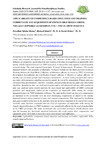| dc.contributor.author | Mutua, Priscillah Nduku | |
| dc.contributor.author | Kimiti, Richard | |
| dc.contributor.author | Mulwa, David | |
| dc.date.accessioned | 2019-12-10T11:02:15Z | |
| dc.date.available | 2019-12-10T11:02:15Z | |
| dc.date.issued | 2019-10 | |
| dc.identifier.issn | 2278-8808 | |
| dc.identifier.uri | http://ir.mksu.ac.ke/handle/123456780/4959 | |
| dc.description.abstract | According to the Kenyan Vision 2030,Technical and Vocational Education play a pivotal role in the
social and economic development of a country. The objective of this study was todetermine the
influence of competence based education and training curriculum on acquisition of employable skills
among visually impaired learners in TVET institutions in Kenya.The study applied a mixed methods
research design. The study targeted 2 principals, 20 heads of departments, 70 trainers, 150 visually
impaired learners and graduates of Machakos Technical Institute for the Blind and Sikri Technical
Training Institute for Deaf-Blind, 2 Ministry of Education officials in charge of TVET, Curriculum
Development Accreditation and Certification Council officials, 3 Ministry of Labour officials, 10
members of civil society groups and 5 managers of industries. A census of the principals and trainers
was taken while purposive sampling was used to sample the rest of the respondents. Primary data was
collected using questionnaires, interview schedules, focused group discussion guide and observation
checklists. Quantitative data was analyzed using descriptive and inferential statistics while qualitative
data was analyzed using content analysis.The study found that applicability of CBET curriculum
positively and significantly influenced the acquisition of employable skills among the visually
impaired learners in TVET institutions in Kenya. The study further found out that core competencies
as stipulated in the curriculum were the most challenging competencies to impart to the visually
impaired learners when compared to basic and common competencies. This supported by the finding
that quite a number of learners in the institutes were not declared competent at the end of their course
work.The study therefore concluded that the level of acquisition of employable skills among the
visually impaired learners in TVET institutions was considerably affected by the level of applicability
of the CBET curriculum. The study recommends that curriculum developers should allocate more
time for learning for the visually impaired learners as this could perfect their competencies and
adaptation of the curriculum to meet their needs and consider their difficulties | en_US |
| dc.language.iso | en_US | en_US |
| dc.publisher | Scholarly Research Journal for Interdisciplinary Studies | en_US |
| dc.subject | Applicability | en_US |
| dc.subject | competence based education and training curriculum | en_US |
| dc.subject | employable skills | en_US |
| dc.subject | visually impaired learners | en_US |
| dc.subject | visually impaired learners | en_US |
| dc.title | APPLICABILITY OF COMPETENCE BASED EDUCATION AND TRAINING CURRICULUM AND ACQUISITION OF EMPLOYABLE SKILLS AMONG VISUALLY IMPAIRED LEARNERS IN TVET INSTITUTIONS IN KENYA | en_US |
| dc.type | Article | en_US |

